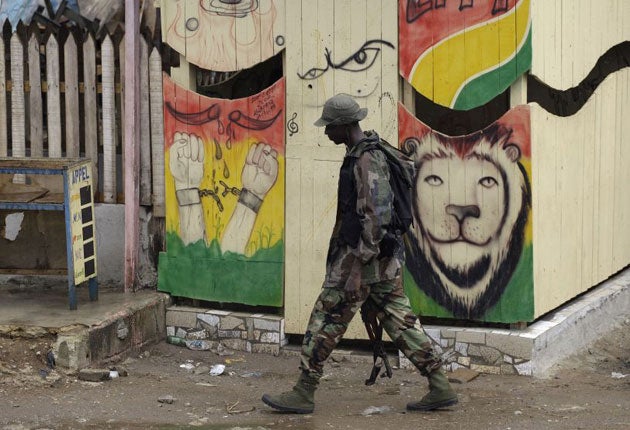United Nations staff in western Ivory Coast have found more than 100 bodies in the past 24 hours, some burned alive and others thrown down a well, in a further sign of the ethnic violence gripping the country.
The grim discovery came a week after the International Committee of the Red Cross said at least 800 bodies had been found in the town of Duekoue after an explosion of inter-communal violence.
United Nations human rights spokesman Rupert Colville said today that UN workers had found 15 more bodies in Duekoue, where the burnings took place, and had discovered more than 60 in Guiglo and 40 in Blolequin - all yesterday.
He said it was hard to say who was responsible as long-running ethnic tensions in the region have grown alongside fighting between forces loyal to presidential claimant Alassane Ouattara and those of his rival Laurent Gbagbo.
However, he said the victims in Duekoue appeared to be from the Guere ethnic group supporting Gbagbo, and that the killings took place when fighters loyal to Ouattara took control of the town in their advance towards the south.
"With these very ugly tit-for-tat killings in Duekoue ... (and) 100 more bodies found just yesterday, you're talking about quite an escalation," he told a news briefing in Geneva.
"Some of the victims seem to have been burnt alive, and some corpses were thrown down a well," he said, adding that the murders appeared to have been in retaliation for the mid-March killing of 100 people by pro-Gbagbo forces in the same town.
The bodies found in Guiglo and in Blolequin were mostly lying in the streets. Most appeared to have been shot while running away and were wearing civilian clothes.
"(In Blolequin) the perpetrators are said to have been Liberian militias, who spared the Guere from other groups after separating them out," Colville said.
"Blolequin was described by the human rights team as a dead town. The population has all fled, and there has clearly been a lot of looting."
The three towns lie at the heart of the cocoa-growing region in the world's biggest producer, near the border with Liberia.
The area has long been prey to deep ethnic rivalries that have fuelled feuding between local Guere tribes and immigrant farmers from neighbouring West African countries, mostly Mali and Burkina Faso, who form the backbone of the cocoa workforce.
Religious and tribal fault lines in the region mirror the divide between Gbagbo, whose traditional power base is in the Christian south, and Ouattara's Muslim, northern-based forces.
Ethnic loyalties straddle the border with Liberia, and both camps have recruited Liberian mercenaries hardened by years of civil war in their own country.
Brutal massacres, exacerbated by festering land disputes, have bloodied western Ivory Coast for over a decade and pose a huge challenge for Ouattara, who is seeking to assert his authority after forcing Gbagbo to hole up in a bunker in the commercial capital Abidjan.
"These killings along ethnic and religious lines, committed by both sides of the political divide, illuminate the deep-seated divisions in Ivory Coast," Corinne Dufka of Human Rights Watch said.
"Ouattara must seek to reconcile these divisions at once and ensure that the perpetrators are held accountable."
While Gbagbo's soldiers have been fingered for most of the atrocities since a disputed November election, Ouattara's forces have also been accused of serious human rights abuses, a factor that could further undermine his legitimacy after taking power.
Ouattara, recognised as the election winner according to U.N.-certified results, pledged in a speech on Thursday to bring those responsible for violence against civilians to justice.
At a Ouattara military camp north of Abidjan, Zacaria Kone, a senior commander, scolded about 100 of his soldiers on Friday.
"Don't go killing someone. If there is a problem, see one of your chiefs here. They (the pro-Gbagbo militias) have massacred our families, but they will answer for that," he said.
Asked by Reuters whether he was referring to specific abuses by his troops, Kone said: "I will think about that question."
Subscribe to Independent Premium to bookmark this article
Want to bookmark your favourite articles and stories to read or reference later? Start your Independent Premium subscription today.


Join our commenting forum
Join thought-provoking conversations, follow other Independent readers and see their replies